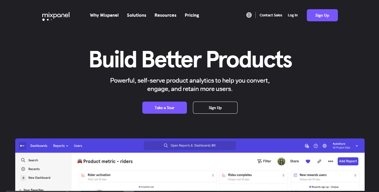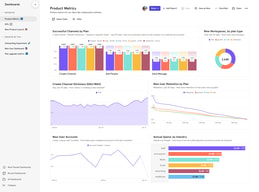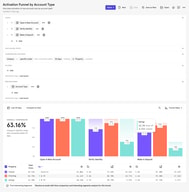

Unclaimed: Are are working at Mixpanel ?
Mixpanel Reviews & Product Details
Mixpanel is an analytics platform used by companies to improve user engagement and boost retention through features such as behavior tracking, funnel analysis, and A/B testing with the intent of streamlining the user experience.

| Capabilities |
AI
API
|
|---|---|
| Segment |
Small Business
Mid Market
Enterprise
|
| Deployment | Cloud / SaaS / Web-Based, Mobile Android, Mobile iPad, Mobile iPhone |
| Training | Documentation |
| Languages | English |





Compare Mixpanel with other popular tools in the same category.

The free tier and their startup programme make it really easy to get up and running with analytics without the fear for spending money your startup probably doesn't yet have.
It took my team a while to figure out what type of product-level events were the best to be sending to mixpanel. This isn't really mixpanels fault though.
Mixpanel is helping my startup better understand how customers are using our app so that we can make changes to our features and measure the impact of those changes at the product level.
So we have used Mixpanel for a little more than 3 years now, and Mixpanel helps getting the overview of our platform. It is amazing how you can structure all this data, and make it into beautiful graphs. We have even used it in presentations for our customers.
It can be quite overwhelming to start with, but in the end, you end up with beautiful results.
Mixpanel is where we sort our data, and make it digistiveable. We track behavior across the platform, and mixpanel help us with the great overview of our platform.
I recently had the opportunity to use Mixpanel for our analytics needs, and I'm thoroughly impressed by both the platform and the support team. A standout experience was with Ashley, their support engineer, who went above and beyond in assisting us. She demonstrated not only deep expertise but also a remarkable commitment to solving our specific challenges. Ashley's proactive approach, coupled with clear and helpful guidance, made our experience exceptionally positive. It's rare to encounter such dedicated and effective customer support. Mixpanel, thanks to professionals like Ashley, has proven to be an invaluable asset to our team.
A touch more expensive then I would want, but worth it.
We need to know how our customers use our product, how they move through our sales funnel. What parts are sticky and where we fail them.
Continuous product improvements. Easy to use interface
Negotiating a contract can be time consuming
Access for all employees to a essential data
Dashboard visualization. I can view all the events through my customer onboarding and understand how to improve my processes.
I don't have any points that I dislike yet. I started to use it fully recently
Customer's events in my app to understand their journey
As a project manager, I have used Mixpanel that is a comprehensive tool that is centered on tracking events and user profiles. The dashboard offers a very intuitive interface that includes a graphical viewer that presents complex data in easy-to-read form. This has been useful in mobile app analysis, especially in heat map illustrations showing users interactions.
We’ve had a few instances where server-side integration protocol seemed lagging, which slightly affected the operations tempo. Furthermore, some parts of the documentation feel a little outdated, and some sections of it have proven to be confusing, and I needed tech support to go around those few confusing aspects.
With the help of Mixpanel, we are able to identify and understand the important user behaviors that directly guide our product development strategies.
Their focus on analytics and analytics only. Their user experience is top notch. Mixpanel team supported us in each step during the integration process. I use mixpanel daily with my queries ranging from 100 - 500.
Becuase of their single focus on analytics, we have to depend on other tools as well. For A/B testing etc.
Mixpanel helps us understand user behavior. This helps in making data informed decisions. Our quality and pace of decision making has skyrocketed after using mixpanel.
What I appreciate most about Mixpanel is its robust capability to unearth deep insights and aid in strategizing effectively. Despite a steep learning curve initially, once mastered, it becomes remarkably user-friendly. The platform's strength lies in its comprehensive data analysis tools that enable us to dissect raw data comprehensively. Additionally, Mixpanel's integration features are seamless and enhance its utility, making it a valuable tool in our toolkit.
While Mixpanel offers an array of powerful features, its initial learning curve can be quite challenging. This complexity at the beginning may deter new users or prolong the time it takes to fully leverage its capabilities. Additionally, while the integrations are generally good, there can be occasional glitches or limitations in compatibility with other tools, which sometimes requires workarounds. These aspects, though manageable, are areas where Mixpanel could improve to enhance the overall user experience.
Mixpanel plays a crucial role in solving our data analysis and insight generation challenges. By providing detailed analytics, it enables us to understand user behavior and track key metrics effectively. This insight is instrumental in shaping our strategies and making informed decisions. The ability to see raw data also allows for a granular level of analysis, leading to more tailored and effective solutions. As a result, Mixpanel has been a significant asset in enhancing our decision-making processes and driving business growth. Its benefits are reflected in our improved targeting, optimized marketing strategies, and more efficient allocation of resources.
Great way to visualize user data and look at ways our users intereact with our app
quite a bit of tech setup to get things working correctly
giving us insight on how users are interacting with our app and other ways they are using features.
We can create our cohort according to user segment
It is a good tool to understand the user sagment and don't find anything which is not suitable
We are in phase of understanding our users and it help in DAU, WAU and MAU segment for both app and web.
